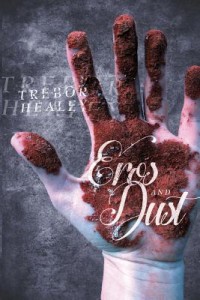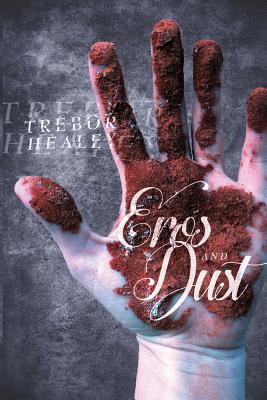 Eros and Dust
Eros and Dust
by Trebor Healey
Lethe Press. 216 pages, $18.
WITH ALL the rancor in the air lately about “bad hombres” running amok in the U.S., you don’t hear much about the other hombres traveling south of the border: gay sex tourists, the subject of several of the stories in Trebor Healey’s wonderful new short story collection, Eros and Dust. But while listening to Trump rant about undocumented Mexicans is about as much fun as a Nuremberg rally, Healey’s tales about gay expatriates and retirees prowling the streets of Latin America in search of love and sex are alternately funny, sexy, and moving.
The book strikes a good balance between Healey’s humorous, satirical pieces and his more pensive, melancholy ones, starting with “Chile,” a wistful recounting of a failed relationship between Jorge, a middle-aged Chilean man who’s haunted by his traumatic memories of the Pinochet years, and Jason, his young American boyfriend whose fascination with that dark era keeps inadvertently triggering painful memories in Jorge. While the two of them are driving along the Chilean coast touring the homes of Pablo Neruda and other monuments of the dead, Jorge broods about the relativity of Jason’s forthrightness and his inability to leave well enough alone: “Jorge thought about how Jason’s honesty—which he clearly considered to be among his virtues—was almost a vice and increasingly annoying to Jorge. Jason seemed to think his honesty was a kind of integrity, but Jorge saw it as narcissism, almost a boastfulness. Jason was the kind of person who would have been tortured and killed, Jorge thought. In South America, there is a time and a place for the truth, and it’s something you figure out quickly as a kid.”
This pairing of cynicism with naïveté is a recurring theme in these stories. In “Pedro and the Mark,” one of the funnier pieces, a guileless expat writer named Theo gets embroiled in a plot to scam a delusional gay gringo out of ten thousand dollars. Although he’s leery of ending up in a Mexican prison, Theo rationalizes that he’ll at least have a good story to write even if things turn out badly. He’s also in love with the scam’s mastermind, Pedro, a twenty-something bisexual from Oaxaca who, unlike Theo, is more than happy to take a swing at the piñata of opportunities provided by the hordes of local gay gringos.
Whether Healey’s being funny or serious, wistful or bitchy, the writing in these stories is uniformly excellent. The fact that he lives part of the year in Latin America gives them a ring of authenticity, and the same could be said of his other stories about gay artists and hedonists in California (where he lives the rest of the time). His ability to write imaginatively in a variety of genres is also on full display, ranging from Southern Gothic and magical realism to fantasy and noir. There’s even a funny gay parody of Jack Kerouac that sounds like it was written by Allen Ginsberg: “I wanted Marco to make sweet love to me. His bejeweled, flower-decked, bodhisattva sphincter would open for me like a lotus flower. It would sing sutras while I rode latex-clad and swollen through the old hobo rails deep in his groaning rectum.”
Regardless of the genre or country Healey is writing in, his gay West Coast voice is always present. It’s a voice that can be delightfully cynical and mocking one minute, lyrically poignant and serious the next. And like fellow Californian writers Christopher Isherwood and Kevin Killian, he writes keenly and vividly about the pleasures and indignities of gay men past their prime who are still searching for sex and romance, often with men much younger than themselves. Indeed, several of the more striking stories in this book are lurid noir comedies about chicken hawks, such as the narrator of “Los Angeles,” a nihilistic video chatroom enthusiast whose depraved scheme to lure a trio of Internet hustlers into unwittingly committing murder backfires hilariously: “There were a million ways to off somebody, of course. But Fred was no coldblooded killer. No, he needed to set things in motion while keeping his own hands clean. And who better to dirty their hands than these arrogant boys who spent a good deal of their time fingering their assholes anyway?”
Like Dennis Cooper writing about serial killers with a weakness for skater punks and emo boys, Healey has an uncanny ability to make even the most unsympathetic monsters wickedly entertaining. But unlike Cooper, who writes about violent sex criminals with a clinical precision that can be hard to stomach, Healey’s sex crime stories are delightfully narrated by acerbic queens full of brilliant one-liners like the one above. If you haven’t read his award-winning novels Through It Came Bright Colors and A Horse Named Sorrow, his new book Eros and Dust is a great introduction to his work.






